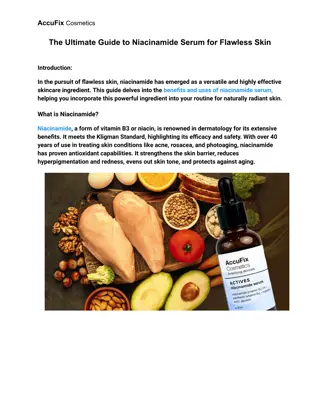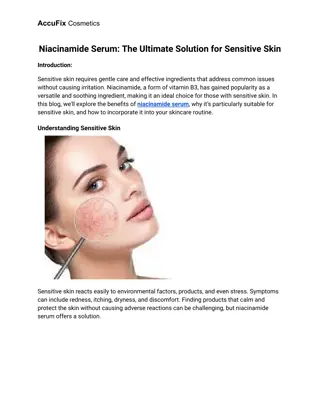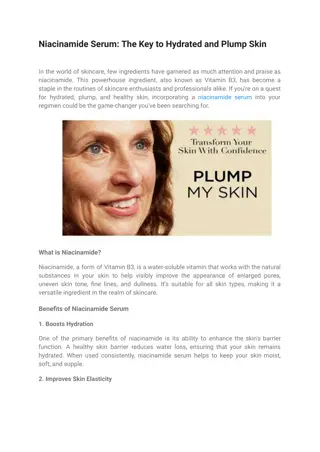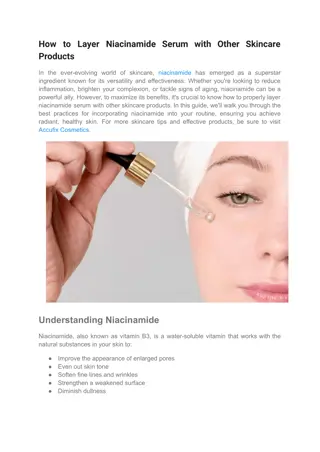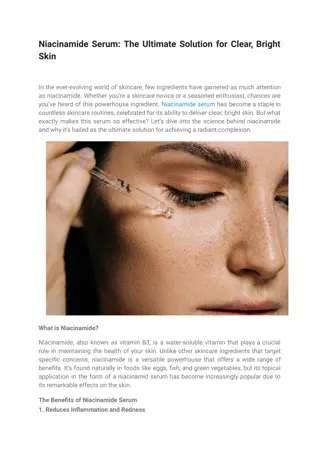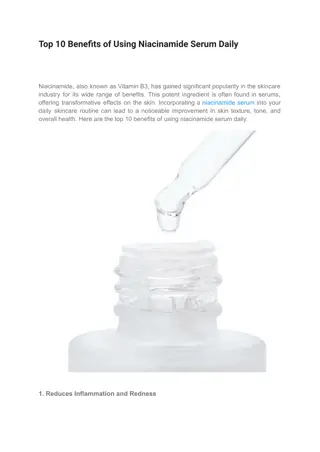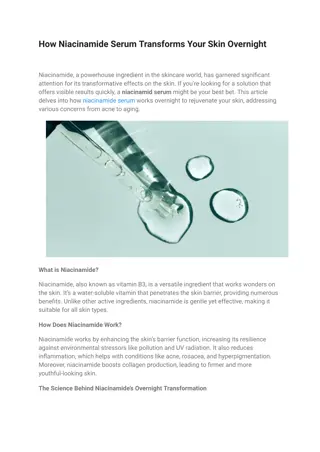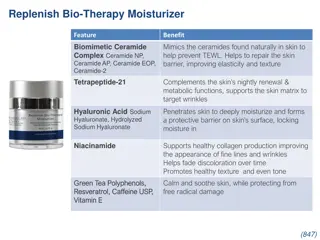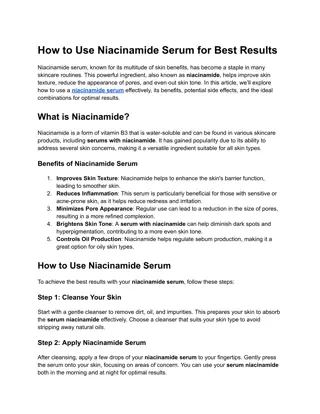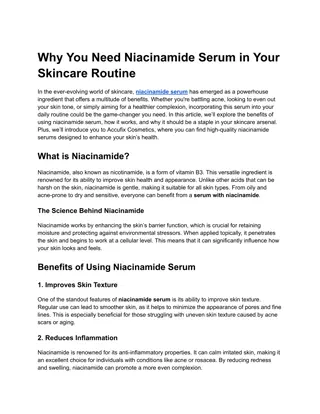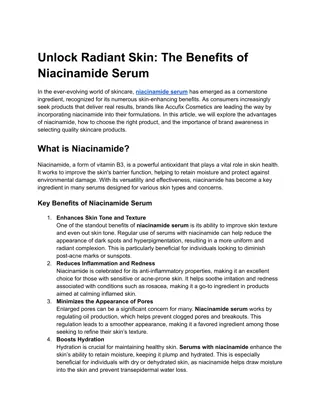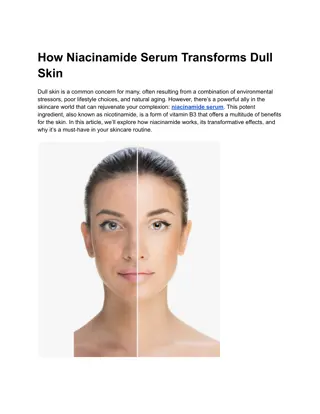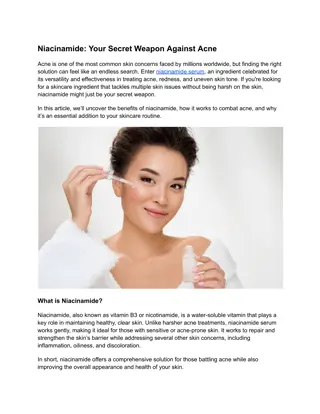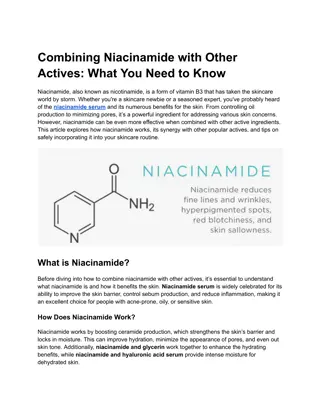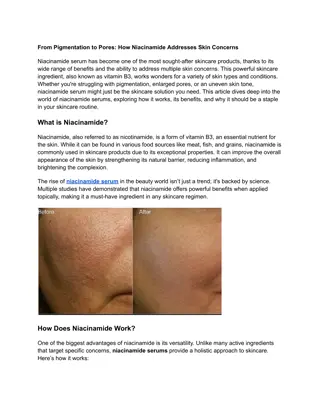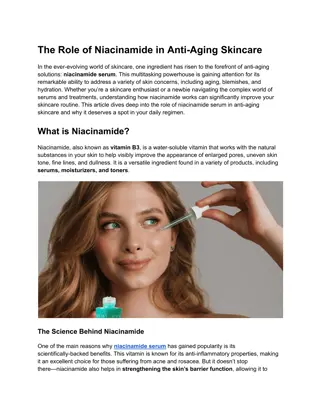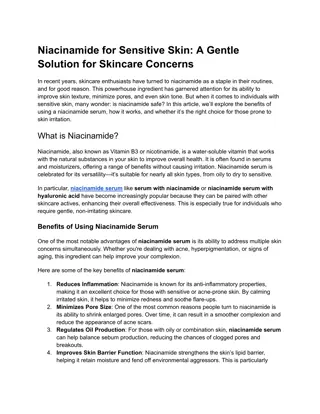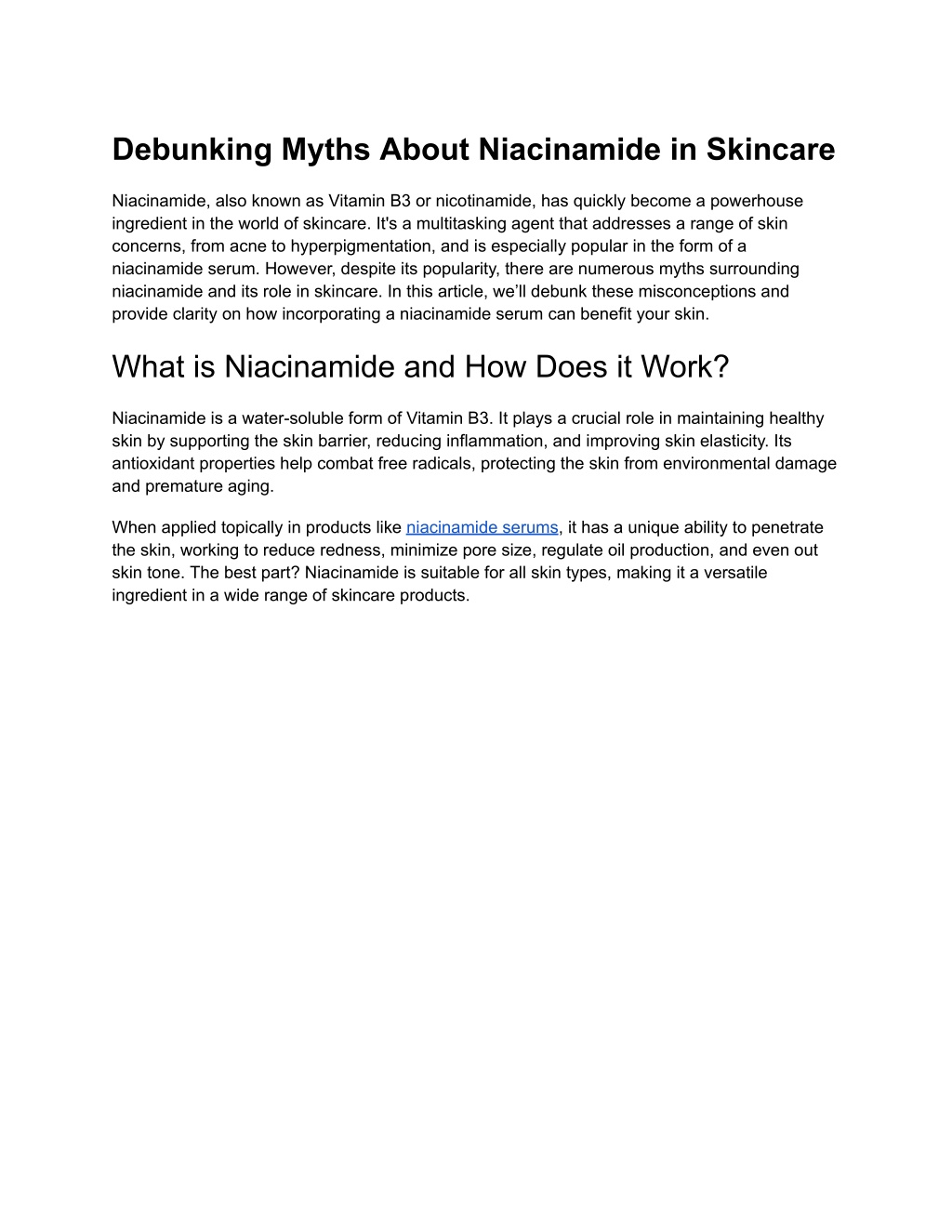
Debunking Myths About Niacinamide in Skincare
In this article, weu2019ll debunk these misconceptions and provide clarity on how incorporating a niacinamide serum can benefit your skin.
Download Presentation

Please find below an Image/Link to download the presentation.
The content on the website is provided AS IS for your information and personal use only. It may not be sold, licensed, or shared on other websites without obtaining consent from the author. Download presentation by click this link. If you encounter any issues during the download, it is possible that the publisher has removed the file from their server.
E N D
Presentation Transcript
Debunking Myths About Niacinamide in Skincare Niacinamide, also known as Vitamin B3 or nicotinamide, has quickly become a powerhouse ingredient in the world of skincare. It's a multitasking agent that addresses a range of skin concerns, from acne to hyperpigmentation, and is especially popular in the form of a niacinamide serum. However, despite its popularity, there are numerous myths surrounding niacinamide and its role in skincare. In this article, we ll debunk these misconceptions and provide clarity on how incorporating a niacinamide serum can benefit your skin. What is Niacinamide and How Does it Work? Niacinamide is a water-soluble form of Vitamin B3. It plays a crucial role in maintaining healthy skin by supporting the skin barrier, reducing inflammation, and improving skin elasticity. Its antioxidant properties help combat free radicals, protecting the skin from environmental damage and premature aging. When applied topically in products like niacinamide serums, it has a unique ability to penetrate the skin, working to reduce redness, minimize pore size, regulate oil production, and even out skin tone. The best part? Niacinamide is suitable for all skin types, making it a versatile ingredient in a wide range of skincare products.
One of the most common misconceptions about niacinamide serum is that it causes irritation, especially for sensitive skin types. This couldn t be further from the truth. In fact, niacinamide is known for its soothing properties. It helps reduce inflammation, redness, and irritation, making it an excellent choice for those with sensitive or acne-prone skin. Unlike stronger acids or retinoids, niacinamide works gently to improve skin health without causing peeling or dryness. If you experience any irritation when using a serum with niacinamide, it s likely due to other ingredients in the product or overuse of active ingredients in your skincare routine. Myth #2: Niacinamide Only Works for Acne While niacinamide is highly regarded for its ability to treat acne, its benefits extend far beyond just targeting blemishes. Niacinamide serums are packed with benefits for the skin, including improving skin texture, reducing fine lines and wrinkles, and brightening dark spots. For those dealing with pigmentation issues, a niacinamide serum is a great option to help fade discoloration over time. Its anti-inflammatory properties also make it a fantastic choice for treating conditions like rosacea. The broad spectrum of benefits niacinamide offers makes it a must-have ingredient in any skincare routine. Myth #3: Niacinamide Cannot Be Combined with Other Actives Some people believe that niacinamide should not be mixed with other active ingredients like Vitamin C or exfoliating acids. However, this is a myth that has been debunked. Niacinamide is a stable ingredient and works well when combined with other actives, such as hyaluronic acid, retinol, or peptides. Pairing niacinamide with hyaluronic acid serum, for example, enhances hydration, leading to plumper and more radiant skin. Similarly, using a niacinamide serum in combination with Vitamin C can improve skin tone and texture while offering protection against oxidative stress. That said, it's always a good idea to introduce new ingredients gradually into your skincare routine to avoid overwhelming your skin. Myth #4: Niacinamide Can Only Be Used by Oily Skin Types Many people assume that niacinamide serums are only suitable for oily or acne-prone skin due to their oil-regulating properties. In reality, niacinamide is beneficial for all skin types. For dry skin, niacinamide helps support the skin barrier, preventing moisture loss and keeping the skin hydrated. When used in combination with glycerin or hyaluronic acid, a niacinamide serum can significantly boost moisture levels in the skin. Similarly, those with combination or
normal skin will find that a niacinamide serum helps balance oil production while maintaining overall skin health. Myth #5: Niacinamide is the Same as Nicotinic Acid Although niacinamide and nicotinic acid are both forms of Vitamin B3, they function differently on the skin. Niacinamide is the amide form of Vitamin B3, while nicotinic acid is the acidic form. Nicotinic acid may cause flushing or redness when applied to the skin, whereas niacinamide is far gentler and does not cause such reactions. This confusion often leads to the misconception that niacinamide is an irritant, but they are, in fact, distinct compounds with different properties. Myth #6: All Niacinamide Serums are the Same Not all niacinamide serums are created equal. The effectiveness of a niacinamide serum largely depends on its concentration and the other ingredients included in the formulation. Most serums with niacinamide have concentrations between 2-10%, with 5% being the most common for daily use. A serum niacinamide concentration of around 5% is effective for treating acne, reducing hyperpigmentation, and improving skin texture without causing irritation. On the other hand, a niacinamide serum with a concentration higher than 10% might lead to some sensitivity, especially for those with very reactive skin. Additionally, some niacinamide serums include complementary ingredients like glycerin or hyaluronic acid, which work to enhance hydration. Others might incorporate antioxidants or anti-aging ingredients for an added boost. When selecting a niacinamide serum, it's important to look at the full ingredient list and choose one that aligns with your specific skincare needs. Benefits of Using Niacinamide Serum The benefits of incorporating a niacinamide serum into your skincare routine are vast and well-documented: 1. Reduces Hyperpigmentation: Niacinamide works to lighten dark spots and even out skin tone by inhibiting melanin production. 2. Minimizes Pore Size: Regular use of niacinamide helps refine the appearance of enlarged pores, giving your skin a smoother texture. 3. Controls Sebum Production: For oily skin, niacinamide regulates oil production, reducing the likelihood of clogged pores and breakouts. 4. Boosts Hydration: Paired with moisturizing ingredients like glycerin or hyaluronic acid, niacinamide helps lock in moisture, improving skin's overall hydration. 5. Anti-Aging Properties: Niacinamide increases the production of collagen, leading to reduced fine lines and wrinkles over time.
6. Soothes Inflammation: It reduces redness, irritation, and inflammation, making it ideal for acne-prone or sensitive skin. Choosing the Right Niacinamide Serum for Your Skin When shopping for a niacinamide serum, it s important to consider the specific needs of your skin. If you're new to niacinamide, start with a lower concentration (around 5%) and work your way up as your skin becomes accustomed to the ingredient. For those looking to target specific skin concerns, such as hyperpigmentation or fine lines, consider a serum that also contains complementary ingredients like hyaluronic acid or peptides. You may also want to check out different price points there are options ranging from luxury formulations to affordable niacinamide B3 serums, including budget-friendly options like niacinamide serum b3 price in Pakistan. Conclusion Niacinamide has earned its place as a superstar in the skincare world, but there are still many myths and misconceptions surrounding its use. Whether you're using it in a niacinamide and glycerin serum for hydration or a niacinamide and hyaluronic acid serum for anti-aging, this versatile ingredient can address multiple skin concerns without irritation. By debunking these myths and understanding how niacinamide works, you can confidently incorporate it into your skincare routine for healthy, glowing skin.


